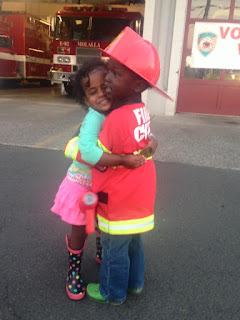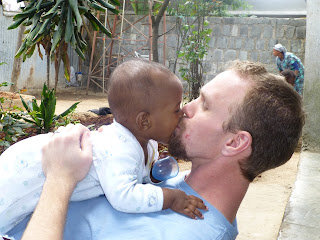 |
| Hanging with my kiddos this evening |
Merry Christmas! Again, this is NOT a Christmas post.
I was grateful for the positive response from the first section of this survey. I was concerned that some people may have felt I over-shared. However, many of the comments I received were expressing appreciation for a glimpse into the not-so-peachy side of an adoption story. Here is the scatterbrained second half of the survey (you can read the introduction and the first part <here>)
The questions addressed in the first half were:
 I do apologize for the barrage of information, thoughts, and lack of structure. Many of the questions raised a variety of multifaceted responses. Hopefully I was able to bring various ideas to light that maybe non-adoptive families haven't processed before. Parenting a child with adoption in their background does raise some issues that other parents don't need to consider. However, with a good support group and adequate education, many families could adopt and add to/create their family. Yes, my children's story is complex and often traumatic. However, there is nothing more rewarding than watching them grow and mature and learn to feel safe and be happy. It is a blessing to be a part of that process.
I do apologize for the barrage of information, thoughts, and lack of structure. Many of the questions raised a variety of multifaceted responses. Hopefully I was able to bring various ideas to light that maybe non-adoptive families haven't processed before. Parenting a child with adoption in their background does raise some issues that other parents don't need to consider. However, with a good support group and adequate education, many families could adopt and add to/create their family. Yes, my children's story is complex and often traumatic. However, there is nothing more rewarding than watching them grow and mature and learn to feel safe and be happy. It is a blessing to be a part of that process.
Feel free to ask other questions, and I'll answer them the best that I can!
I was grateful for the positive response from the first section of this survey. I was concerned that some people may have felt I over-shared. However, many of the comments I received were expressing appreciation for a glimpse into the not-so-peachy side of an adoption story. Here is the scatterbrained second half of the survey (you can read the introduction and the first part <here>)
The questions addressed in the first half were:
- How did you come to the decision of adopting the child?
- How old was the child when adopted?
- How old were your children?(if any)
- Was there any trauma that came with the child?
- How it affected your children?(if any)
- Were the biological parents easy to deal with?
- How long did the adoption process take?
Coffee (milk) with Uncle Daniel
after our Tae Kwon Do class
 |
And the second half:
- Did you have to deal with any problems that the child had? Again, that is somewhat a redundant question. Since adoption is infused with loss from all angles, there are naturally “problems” that arise. In fact, that adoption exists in the first place means that “problems” existed. I’m not sure that “problems” is a good term. I think what you are asking is “What challenges did you need to overcome as you brought this child into your home?” If that is the question, then the answer is somewhat lengthy. Both our kiddos had intestinal issues as they came home. This is quite normal, since they had lived in a third-world orphanage most of their lives with limited access to clean water. In fact, while we were visiting the town where they were born, we were served coffee made from river water. This is not "gross" or a lapse in courtesy. It is quite normal and just how things are done there. No one thinks twice about it. So, we had poop issues. In fact, by the time we arrived home, Anya was wearing her last pair of pants, since she had pooped through the rest of them. I scrubbed poop out of the airplane carpet, and off the airplane walls. Besides poop, English was the third language the kids had
been exposed to. They were not familiar with English words or sounds. When we met the kiddos, we were the first white people they had ever seen. Hours of screaming ensued. That was traumatizing in itself, for both them and us! The kiddos needed to adjust to our diet, and we needed to learn what foods would not negatively affect their systems. We learned that Anya is sensitive to dairy. Random things would scare the kiddos, and inconsistently. For example, a few times someone would walk into the house and Anya would cling to me and wail. These were people she knew and previously liked, but for whatever reason she was terrified of them that day. Not just fussy, but trembling with fear and unable to even look at them or release her vice grip on me. She has since overcome that and I still have no idea why it happened. For a while, we needed to be careful in groups. It is natural for friends and family to pick up and touch and kiss a baby. However, while Philip and I know these people, my children do not. Even grandparents are initially complete strangers, and a kiss from a grandparent can make a child feel vulnerable and undermine the feeling of security that we work towards. - Did it take long for the child to feel accepted into your home? I’m not sure that “feeling accepted” is the issue as much as “feeling safe, secure, and belonging”. For my kiddos, there wasn’t any problem of acceptance. Our friends and family did a wonderful job opening their hearts to my small folks, and the kiddos never experienced any negative emotions from family and friends. I would say, though, that it took Jayce 6 months to really laugh after he came home. He was incredibly solemn for so long. For Anya, we are just beginning to see her initiate affection towards me. Just a few weeks ago she asked for me to comfort her (a bumped head) instead of Philip. This is a HUGE step towards attaching and bonding with me. Showing a preference is healthy: everyone is not the same in her eyes. It was the first time she asked for me, even though her Daddy was available. Each adoption is different, and each family and story is different. We are blessed that we have not experienced many issues that could arise in similar situations. Helping our children feel safe and secure is, and will continue to be, an ongoing and purposeful process.
- What were/are the positives and negatives? The positives and negatives of adoption? Well, adoption is not for everyone. If someone sees adopted kiddos as somehow inferior or less ”real family” as a biological kiddo, then they should not do the disservice to a child in adopting them. Kiddos that have been adopted are just as much a part of a family as those kiddos born into it. An adoptive mama is just as much a real mama as one who has given birth. There is a LOT of negative perceptions and downright wrong information regarding adoption. Racism is alive and well, despite what people would tell you. BUT, while people might not feel ready to adopt, there is NO CHILD that is “ready” to be an orphan. EVERY child deserves a loving and safe home, no matter their background, disabilities or abilities, birthplace or status. So, adoption gives value to human life- something that I think is lacking in today’s culture. It is a picture of redemption and love: taking a child that is otherwise without hope and placing them into a family where there is hope and a future, and love and care. This is not based on the merits of the child, but on the love, choices, purpose and values of the parent. Every adoptive situation is tragic. The fact that a child needs to be adopted means that somewhere, somehow, tragedy happened. Part of the adoptive parent’s job is to help that child heal. That is a huge responsibility and an astounding blessing, to be used to influence such a precious creation. Adoption is a legitimate way to have a family, and is not inferior to birth. It is a fallacy to believe that adoptions happen as a “last choice” for couples to have children (i.e. “We can’t get pregnant so I guess we’ll have to adopt.”). This is often not the case at all. Adopted kiddos aren’t “lucky” to be in a loving family. The set of circumstances that got them adopted is, in fact, very “unucky”. So I am not sure how to address the “pros and cons” of adoption. I suppose part of it would depend on the value system of the parents. Adoption is not the “easy road” to a family. It’s not smooth sailing or a responsibility to be taken lightly. However, I firmly believe that it is not as unattainable as many people would believe it to be. There are MANY resources for adoptive parents, including parents whose children are having troubles working through their past. There are financial resources to help families (like scholarships at college), support groups for various challenges like learning delays or medical concerns. There are resources to help parents and children bond, therapists and counselors that are dedicated to helping adoptive families.
 |
| My daughter is beginning to learn to dress herself.... with varying measures of success |
 I do apologize for the barrage of information, thoughts, and lack of structure. Many of the questions raised a variety of multifaceted responses. Hopefully I was able to bring various ideas to light that maybe non-adoptive families haven't processed before. Parenting a child with adoption in their background does raise some issues that other parents don't need to consider. However, with a good support group and adequate education, many families could adopt and add to/create their family. Yes, my children's story is complex and often traumatic. However, there is nothing more rewarding than watching them grow and mature and learn to feel safe and be happy. It is a blessing to be a part of that process.
I do apologize for the barrage of information, thoughts, and lack of structure. Many of the questions raised a variety of multifaceted responses. Hopefully I was able to bring various ideas to light that maybe non-adoptive families haven't processed before. Parenting a child with adoption in their background does raise some issues that other parents don't need to consider. However, with a good support group and adequate education, many families could adopt and add to/create their family. Yes, my children's story is complex and often traumatic. However, there is nothing more rewarding than watching them grow and mature and learn to feel safe and be happy. It is a blessing to be a part of that process.Some other posts that relate:
Here is a post on adoption vocabulary http://eyestothemountains.blogspot.com/2012/01/adoption-vocab-101.html
A glimpse into some fallout of a difficult childhood:
http://eyestothemountains.blogspot.com/2015/05/tantrums-and-collective-nouns.html
Adoption as it relates to pregnancy:
http://eyestothemountains.blogspot.com/2014/01/stages-of-pregnancy-adoption-style.html
































































